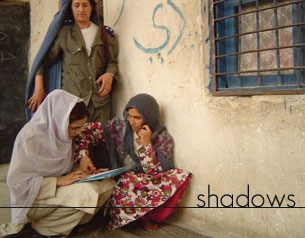Shadows
'My name is Mary and I live in Kabul. I was born during the war, and I grew up during the war'. Mary is a beautiful young Afghan woman who wanted to become a doctor. A revealing story covering the deep gender divisions at the heart of Afghan society.
 'My name is Mary and I live in Kabul. I was born during the war, and I grew up during the war'. Mary is a beautiful young Afghan woman who wanted to become a doctor. She leapt at the chance to start medical school. But after one term Mary leaves Kabul university after suffering discrimination because of her sex. Following the collapse of her education she resolves to become a journalist, and to document the suppressed lives of Afghanistan's women. In a video diary styled commentary Mary narrates her fascinating journey. Our hearts go out to her as she shows no fear in directly challenging the bigotry she finds - and in so doing putting herself into significant danger. Shadows reveals that since the liberation of the country from the Taleban, little has changed beyond Kabul for Afghan women.
'My name is Mary and I live in Kabul. I was born during the war, and I grew up during the war'. Mary is a beautiful young Afghan woman who wanted to become a doctor. She leapt at the chance to start medical school. But after one term Mary leaves Kabul university after suffering discrimination because of her sex. Following the collapse of her education she resolves to become a journalist, and to document the suppressed lives of Afghanistan's women. In a video diary styled commentary Mary narrates her fascinating journey. Our hearts go out to her as she shows no fear in directly challenging the bigotry she finds - and in so doing putting herself into significant danger. Shadows reveals that since the liberation of the country from the Taleban, little has changed beyond Kabul for Afghan women.
At first Mary's impression is that life for women has improved since the overthrow of the Taleban - a woman operating machinery tells her 'We are happy'. Women and girls can now work and attend school. But outside Kabul, she soon discovers a very different world. At the marketplace in Mazar-e-Sharif, women refuse to talk to her. 'It is because they are illiterate' explains a local man. 'For sisters who are uneducated, they should wear a burqha', agrees one of the only women to offer an opinion. Realising just how difficult her task will be, Mary returns to Kabul to confront some of her own demons.
She returns to the medical facility she left in such cloudy circumstances a year before. Corruption and sexual molestation are rife in the department. 'I left the faculty because I did not have the money for bribes, and would not let the teachers touch me' she recalls. Even the head of the medical faculty at Kabul University has to ask the teachers to help his daughter pass. 'Only those who have money or who can satisfy the teachers' requests can study here' explains a girl from behind her veil, afraid to openly express her opinions. When the head of the faculty, Dr Cherag Ali, is confronted, he angrily attacks the cameraman, sending the camera flying.
Setting off once more into rural Afghanistan, there is more sadness and frustration for Mary. In Kandahar Mary meets Afghanistan's first female police officer - Malalai. But she is still the only officer in the former Taleban stronghold. And her caseload paints an even bleaker picture. She is trying to help a 13 year old girl who has been raped. 'If you had been raped, would you be happy'? 'There are more such cases now than there were during the Taliban,' Malalai tells Mary. 'Every week there are two or three cases like this. There is no such thing as women's rights'. The girl, not the criminal, ends up locked up in prison.
In a nearby rural village Mary investigates the ancient tradition of 'badd'. A family tells Mary that three years ago a man was murdered. In compensation, his family was awarded three sisters from the murderer's family. The tradition will continue through to the younger generation. 'It seems clear Badd is ending the lives of women to rescue men' laments Mary. 'I will never accept that women should be the victims of other people's crimes'.
In sequence after sequence Mary brazenly peers behind the darkest secrets of Afghanistan's all smothering chauvinism. 'All over my country I have seen that women are under the control of men. It is hard to believe that this can change. I have hope for the future, but I realise that I must be patient, it will take time'.
FULL SYNOPSIS
